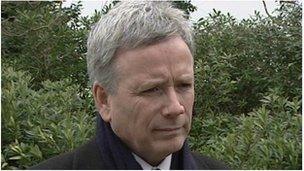Seeing your GP - time to think twice?
- Published
The move is designed to reduce pressure from swamped emergency departments
Getting an appointment to see your GP could become increasingly difficult.
Under new plans which will change how some services are delivered in Northern Ireland, GPs will be expected to do a lot more in the community.
The idea is to remove pressure from already swamped emergency departments which are over used and expensive to run.
However, that could mean that members of the public will have difficulty accessing an appointment.
While some people said they had no problem getting to see their doctor, others said they often have had to wait one or even two weeks.
Ciara Hunter from Ballyclare contacted the BBC Newsline Facebook page.
When her 15-month-old daughter became ill at Christmas, she was turned away from the out-of-hours service and, instead, had an unnecessary wait in her local accident and emergency department.
"We spent 12 hours waiting for a doctor and a consultant to give us the okay to leave because we were told to go to A&E," she said.
"If a doctor on call had seen us and had done the same test, we could have been in and out in half an hour."
The chief executive of the Health and Social Care Board John Compton said people were entitled to have quick and easy access to medical care.
However, he said that process relied on various different parts of the health system, including pharmacies and out-of-hours services, working together.
"One of the quality measures for any health and social care system is speed of access. People want access quickly and appropriately. Of course we want to see it get better,
"I think for the overwhelming majority of people, the system really does work," he said.
With more than 1,100 GPs and 450 locums practising in Northern Ireland, on paper, it seems that supply should satisfy demand.
But the public body which represents the patient voice, the Patient Client Council, said the system did not always work according to plan.
Chief Executive Maeve Hully said if the system is to be modernised, it must be done in its entirety.

Dr Black said people should ask themselves if they really need to see a doctor
"Some of the people who have spoken to us have talked about feeling blamed for arriving in an emergency department when they perhaps could have had care elsewhere," she said.
"Unless there is better information about the services that are out there - for example the GP out-of-hours and the minor injuries units - people will continue to go to emergency departments because they know they will get care."
Another problem that is clogging the system is that people in Northern Ireland tend to visit their GP more - in fact 20% more than their English counterparts. Doctors said that under the new system, some members of the public need to rely on them less.
Dr Tom Black, a GP in Londonderry, said that people should ask themselves if they really need to see a doctor.
"With limited resources and increasing demands from elderly people with more chronic diseases, we need to apply the resource to those with the greatest need, not those with the greatest want. If you're young and have a minor illness, probably deal with it yourself through the pharmacist," he said.
Northern Ireland's health system is on the move. Those drawing the map say it will become a much more efficient service.
In the Republic of Ireland, they tackled the problem by introducing charges. While this is effective, it is a controversial move that so far is not being considered in Northern Ireland.